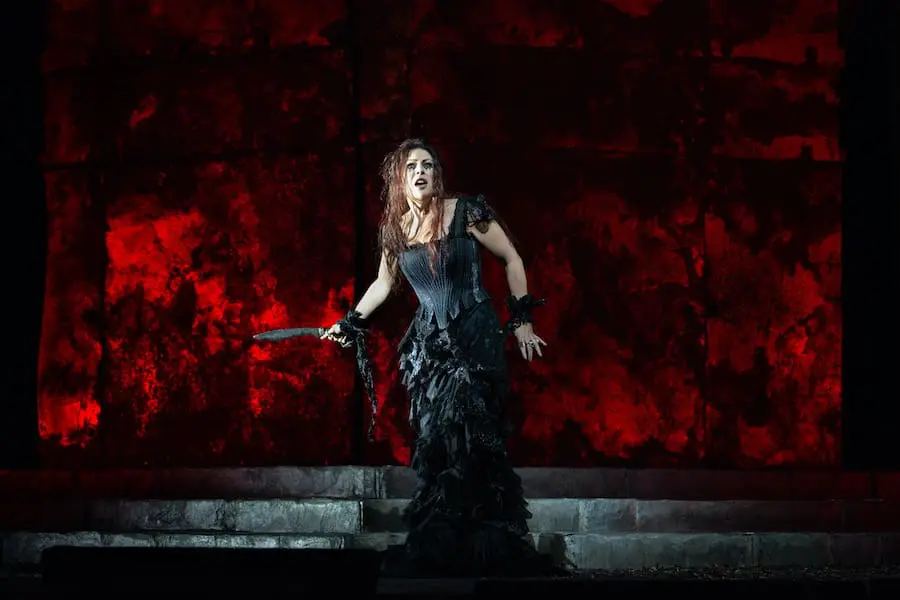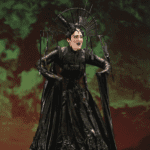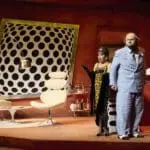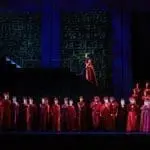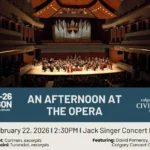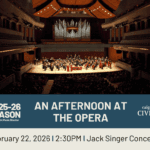Greek myths might bring to mind settings of vast chalky columns bathed in Mediterranean light, but not so in this production of Luigi Cherubini’s adaptation of the tragic tale of Medea. After an exuberant, stormy overture, the curtain rises on King Creonte’s palace, here a dark fortress of charred black brick and burnished doors flayed with rust that shine gold, green, black, and finally, the deep blood-red of Medea’s final act of vengeance. This first glimpse sums up Sir David McVicar’s approach to an opera enjoying one of its periodic resurrections, landing for the first time on the Candian Opera Company (COC) stage. What can one do with a plot that starts with so much bad blood, where multiple murders have occurred before the narrative at hand even begins? The answer comes in the form of a production that revels in sensory excess. An enormous, sloped mirror magnifies as much as it contorts the action, giving a warped bird’s-eye perspective otherwise inaccessible to the spectator’s eye, making the most dramatic moments—of love, grief, bloody savagery, fury, and celebration alike—all the more acute in their impact. Enormous doors slide imposingly on an angle, used cleverly as on multiple fronts: constructing a focal point for arias; allowing set changes to occur throughout, and a symbol of Medea’s exile and isolation.
The visual spectacle presents a decadence that, underneath its shimmering gold dresses and elegant head-wear, seethes with something ominous and rotten, the seeds of the ruin yet to come woven into the dresses’ deep jewel tones and baked into the acrid black of the crumbling walls. Even the infamous golden fleece has little lustre about it, its carcass splayed on stage as an effigy. McVicar’s design speaks to the disjunctions of Cherubini’s score, in which the merriest of passages—sprightly flutes, sentimental melodies—cloak a perpetually agitated underbelly. The spectre that is Medea’s fury and eventual revenge hangs over the stage from the beginning: a long feast table decked out to celebrate Giasone and Glauce’s marriage holds premonitions of its transformation into a sacrificial altar, flowers that will be soaked in her blood, even before the fact.
Analysts of the female psyche like nothing more than the phenomenon of the terrible mother, a sometimes perverse fascination with the madre snaturata, the unnatural mother, and McVicar’s production never shies away from the brutal realities of the tragedy. And what a luxury to have American-Canadian soprano Sondra Radvanovsky back in Toronto, a powerful match for the sheer vocal and bodily physicality of the title role, requiring an enormous amount of presence on stage. If delivery is not always flawless, the slight edge that comes in on occasion is, if anything, befitting Medea’s character, and there isn’t a shred of argument to be had about the superhuman strength that she brings to the performance. She shines equally in passages of sinuous control, in the delicate tone required to perform Medea’s false penitence and supplication to Creonte, and in moments of genuine lament. But she is at her best when she lets loose the full throttle of the rage and pain of la fatal maga torva, the “grim, fatal sorceress.” Flexing formidably in both a low chest voice—sometimes in a vengeful quasi-sprechstimme—and at the heights of her tessitura, Radvanovsky’s voice surges out, grabs through your chest, and never lets go. In her final self-confrontation in Act III (“E che? Io son Medea!”) and in her final line,“Colà t’aspetta l’ombra mia!…,” her immense vocal power seizes you, wraps its tendrils firmly around your heart, with no doubt that whether in her own death or those at her hands, Medea is victorious. Matthew Polenzani’s brilliantly lyrical tenor is particularly well suited to the shifting qualities needed for Janus-faced Giasone: soothing and amorous to his new bride, but unsettled and vexed in duets with Radvanovsky, where both play off each other’s energies to present the quintessential toxic couple.
The orchestra crackles under a remarkably energetic Lorenzo Passerini, finicky rhythmic changes handled well and delivering suitably zealous contrasts. Multiple COC debuts, meanwhile, bring a new roster of vocal excellence to the stage: Janai Brugger offers a spectacular range in Glauce’s unhappy role, demonstrating a keen flexibility throughout and an abundance of expressive variety—truly a force to be watching. Alfred Walker delivers a wonderfully rich bass-baritone as King Creonte, imposing and sensitive where necessary, and a warm, lush mezzo emerged from Zoie Reams as Neris, Medea’s loyal maid, impressive in the Act II aria “Solo un pianto con te versare.”
Visually, the design is all-consuming in its capturing of the dark, tormented soul of the drama, but I wouldn’t say it’s the most obvious in terms of actual setting, whose impact on the narrative is far more minimal than its sensory effects. Doey Lüthi’s costumes are perceptibly fin de siècle, with a definite touch of steampunk among the Gilded-Age dresses landing us in the “early 20th century,” but there is something inescapably Baroque in the tableaus that unfold. Think of the fierce chiaraoscuro of a Caravaggio, or those still-life paintings of the Flemish Renaissance where brilliantly colourful flowers sit against a dark, oily background, or where lobsters, oysters, fruits, and yet-to-be plucked pheasants heap on a table, a paradoxical moment of beauty at once vibrant and already decayed. To be drawn into the spectacle onstage is to find oneself in the interior of the most unabashed Rococo churches you might find in Seville, Munich, or Vienna—not those whose intricate white designs are flushed with gold, powder-blue and pink, but those where upon entering you are suffocated by black marble and by the most lavish Catholicism a goldsmith could produce. Some of the swashbuckling ensemble and soldiers’ costumes, meanwhile, bring French Revolutionary echoes, honouring, perhaps, the opera’s origins as Médée, first performed at the Théâtre Feydeau in 1797 after a period where the politicization of the Parisian stage was inescapable (that theatre was indeed a site for anti-Terror and counter-revolutionary activity).
This is an opera that seizes you by the scruff and makes you want to come back for more; decide for yourself, and hurry to do so, if the infernal end is too much, or if it is precisely the quota of brutally glorious spectacle that “la fosca maga,” the dark sorceress, invites and deserves.
Related Content ↘
Opera Canada depends on the generous contributions of its supporters to bring readers outstanding, in-depth coverage of opera in Canada and beyond. Please consider subscribing or donating today.


